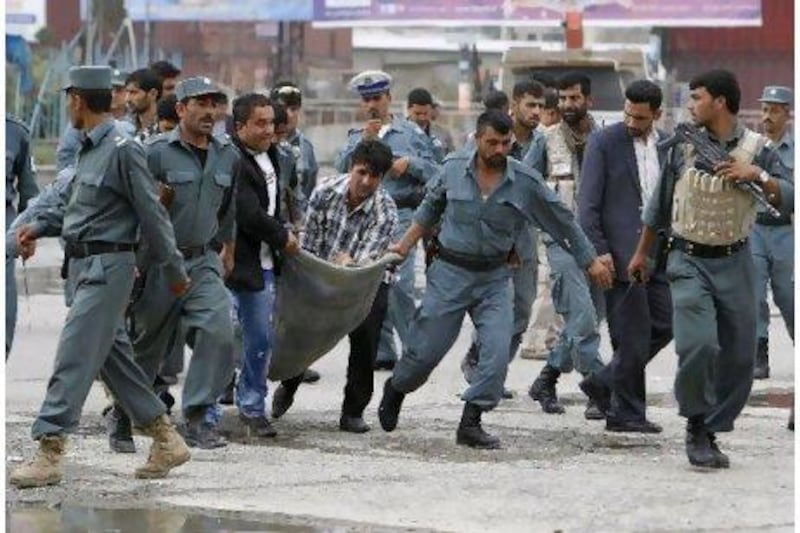KABUL // The Taliban's most comprehensive attack on the Afghan capital in a decade ended yesterday after a 20-hour siege in which 27 people were killed.
Armed with machine guns, grenades and rocket launchers, 11 militants began a series of coordinated suicide attacks in Kabul on Tuesday.
These included rocket assaults on the heavily fortified US Embassy and Nato headquarters.
The scale of the siege has dealt a blow to US-led efforts to transfer security to the Afghan army and police by 2014.
The militants detonated explosives at four targets and security installations across the city, including two police stations in the west and an attempted attack on Kabul International Airport.
Six attackers then stormed an unoccupied, 12-storey building overlooking the US Embassy and fired rockets at the mission and nearby residential neighbourhoods, paralysing daily life in the city.
It took both Afghan and foreign troops up to 20 hours to clear the building floor by floor in a bid to reach the gunmen, prompting sprays of gunfire and explosions all night.
Eleven Afghan civilians were killed in the battle, more than half of them children, along with five Afghan police officers, said US Marine Corps General John Allen, the top commander of US and Nato forces in Afghanistan.
Besides the insurgents in the building, four other attackers served as suicide bombers - three of them killed by police before they could detonate their explosives.
The Pakistan-based Haqqani network is believed to have carried it out on behalf of the Taliban.
The last Taliban fighter was killed just after 9am in Kabul.
Ryan Crocker, the US ambassador to Afghanistan, said: "Unable to confront Isaf [International Security Assistance Force] and newly trained Afghan troops on the conventional battlefield, they have turned to launching attacks on high-profile facilities like the US Embassy. The attacks highlight the weakness at the core of the insurgency."
Some analysts agree. Taliban insurgents, while strong in the provinces and even in control of a number of rural districts, do not have the capability to take and hold major cities.
While the attack in Kabul struck fear into the hearts of residents, the number of casualties did not surpass other recent attacks in Kabul and the militants reportedly failed to severely damage either the embassy or Nato base.
"Four guys fighting to the death in Kabul are not going to seize or hold anything. This is a publicity attack," Tim Mathews, a former army infantry officer with experience in Afghanistan, posted on Twitter.
But many Afghans say this attack, which comes on the heels of a series of high-profile assaults by insurgents in the once-safe capital over the summer, indicates an emboldened and increasingly sophisticated insurgency. Even if the attacks are more symbolic than tactical, militants can easily penetrate some of the most secure areas of Kabul with large caches of weapons, fighting off both Afghan and Nato troops for hours at a time.
"I have never seen such an attack in Kabul in all my life," said one Afghan journalist, who wished to remain anonymous. "But I wasn't afraid. It was obvious what they wanted to achieve - attention. They didn't really think they could take the US Embassy."
According to security officials in Kabul, militants used burkas, the long covering worn by many Afghan women, to smuggle weapons into the building ahead of the attack.
It gives Afghans little faith in their army and police, who were unable to stop the attack but are due to take control of security by 2014. Kabul was officially handed over to Afghan troops from foreign forces in July.
"The Taliban are getting stronger each day and the government just sits quiet," said one Kabul resident, Mir Akbar. "They cannot fight the Taliban." Just last month, Taliban fighters stormed the British Council, a UK-based cultural and education centre, in western Kabul.
They fought with Afghan and Nato forces for nearly 10 hours before the siege ended, leaving 12 dead, including one New Zealand special forces officer.
In June, Taliban fighters seized the InterContinental Hotel, a landmark facility in Kabul, on the eve of a conference on security transition.
The attackers battled Afghan troops until Nato helicopter gunships arrived to finish off the militants who were firing from the roof.
"These attacks make it very obvious that the Taliban is not operating spontaneously any more and that they are very careful in their planning of the attacks, both for the element of surprise and for the media effect," said Daoud Sultanzoy, a former Afghan member of parliament.
* Additional reporting by Zubair Babakharkhil in Kabul and the Associated Press





